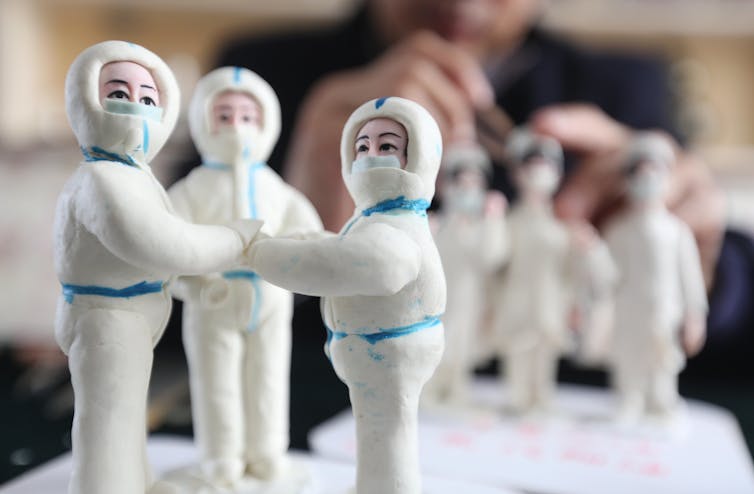Belinda Kong encourages us all to appreciate the human dimensions of epidemic life.

By Belinda Kong
The Conversation
 Fear and blame appear to be fast becoming Americans’ defining emotions around COVID-19. Headlines seem to offer either worst-case estimates or government leaders’ mutual accusations.
Fear and blame appear to be fast becoming Americans’ defining emotions around COVID-19. Headlines seem to offer either worst-case estimates or government leaders’ mutual accusations.
Amid the bewildering figures and contradictory political narratives, it is important to recall that numbers and governments are abstractions – whereas people actually live with and through disease. By fixating on the former, we risk losing sight of the human dimensions of epidemic life.
As a scholar researching the cultural aspects of the 2003 SARS epidemic, I too initially focused on geopolitics and biosecurity. But what I discovered in addition – rarely discussed but vitally humanizing – were the vibrant forms of everyday communal life generated by SARS at its very epicenters.
Under conditions of obligatory isolation and social distancing, common people invented new kinds of sociality and new genres of epidemic expressions. With COVID-19 now even more than SARS, the Chinese internet and social media offer a cornucopia of examples of epidemic communities brought together by heart, humor and creativity.
Pandemic Solidarity
One early set of viral videos surfaced in Wuhan just five days into the city’s lockdown. On the night of Jan. 27, residents shouted “jiayou” – literally “add oil,” meaning “hang in there” or “don’t give up” – out their apartment windows, in a spontaneous burst of solidarity. It was a demonstration of collective strength and defiance, of people’s refusal to be quelled by the virus and the quarantine, and their desire to cheer each other on.
One of these clips, uploaded onto YouTube by The South China Morning Post, has received over a million hits, with netizens from numerous Asian countries echoing “Wuhan jiayou!” in encouragement. Indeed, the refrain has flourished into a rallying cry among an international public on social media, despite the Chinese government’s attempts to co-opt it as a slogan for ethnonational patriotism.
Pandemic Care
This spirit of reciprocal support extends to the care of animals. The Wuhan lockdown has stranded tens of thousands of residents outside the city, leaving an estimated 50,000 pets trapped in unattended homes. Through social media, some pet owners connected with Lao Mao (“Old Cat”), who heads a team of volunteer animal rescuers in Wuhan. These rescuers now roam the city and sometimes break into deserted homes to feed abandoned cats and dogs.
Outside Hubei, other animal lovers likewise help those stuck inside the province look after their pets at home. These tales of animal caretaking, even in times of human crisis, can usefully offset perceptions of Chinese culture as simply one of cruel and unbridled animal consumption.
Another unexpected focal point for communal care is the face mask. Across China, masks have become a powerful vehicle for enacting goodwill, generosity and fellowship during the epidemic. In one viral video from Anhui, an anonymous Good Samaritan was captured on surveillance camera dropping off 500 masks at a local police station. As he hurried away, two officers ran outside to salute him.
This video in turn inspired the Hong Kong-based singer G.E.M. (Gloria Tang/Deng Ziqi) to compose “Angels,” a song that garnered nearly 600,000 hits within the first day of its upload. A tribute to ordinary people’s small acts of fortitude and kindness during the outbreak, the music video opens with the Anhui clip and then splices together other moving scenes, including a train employee gifting a mask to an elderly woman passenger and a man distributing free masks to travelers in an airport abroad.
Pandemic Humor
This creative energy has also spurred China’s folk humor culture. In locked-down sites across the country, social media is spawning a new genre of quarantine humor. On Weibo, WeChat and Douyin, memes of quarantine boredom and stir-craziness proliferate. Netizens record themselves singing the lockdown blues by rescripting classic tunes, fishing from home aquariums, playing mahjong with plastic bags over their heads, playing solo mahjong, playing living-room badminton and choreographing wacky dance moves.
People also showcase their creative flare in donning protective gear and venturing out to neighborhood convenience stores and parks in inflatable costumes of T-Rex dinosaurs, green aliens and Christmas trees. When they run out of face masks, some half-jokingly substitute with bras, sanitary pads, and orange rinds.
As Manya Koetse reports from Beijing, these social media trends allow people to “mock neighbors, their friends or family, or even themselves in the extreme and sometimes silly measures they are taking to avoid the coronavirus.” But more than mockery, the very sharing of these memes is a constructive and healing social act. In times of high stress and distress, to sustain these virtual communities is to deliver shared recognition, concern and laughter.
This is not to say that China’s epidemic experience is solely lighthearted or affirming. Yet neither does life at epicenters have to be apocalyptic, defined by epic heroes and villains or horror scenarios of collapse and conflict.
Indeed, in other countries that have since become COVID-19 epicenters, social media offer similarly inspiring examples. Frontline health workers in Iran dance in hospital hallways to buoy their patients as well as themselves, and Italians in lockdown sing from their balconies to boost each other’s morale – in turn prompting a string of “Italy jiayou” videos from Chinese netizens.
Collectively, these chronicles attest to the idea of pandemic resilience – the possibility that disease outbreaks can be lived through with empathy, ingenuity and sheer human ordinariness.
Belinda Kong is professor of Asian Studies at Bowdoin College.
This article is republished from The Conversation under a Creative Commons license. Read the original article.
The views expressed are solely those of the author and may or may not reflect those of Consortium News.
Please Donate to Consortium News.
Before commenting please read Robert Parry’s Comment Policy. Allegations unsupported by facts, gross or misleading factual errors and ad hominem attacks, and abusive or rude language toward other commenters or our writers will not be published. If your comment does not immediately appear, please be patient as it is manually reviewed. For security reasons, please refrain from inserting links in your comments, which should not be longer than 300 words.

Yes! JIAYOU—-it makes good sense
To live one’ s life in present tense.
For FEAR is distasteful,
And frequently wasteful
BUT –America’s often quite dense!
I am very disappointed that even Consortium News has not published any report on the Covid-19 situation in Iran. The Main Stream Media are treating Iran, as if doesn’t exist. The number of patients or the number dead in Iran do not even count in the statistics.
Well over 100 years ago Kropotkin and others put forth that “Mutual Aid” is the natural way. I agree, and moreover, this is not in conflict with Darwin’s ideas and discoveries. Sadly, the inherently understood concept of “Mutual Aid” has been stifled for the benefit of just a few, or so it seems to me. Perhaps that can change. I hope so.
Peace, Ken
” It sure as hell doesn’t exist here in the US.”
It will do in some assay even if the social relations self-described as “The United States of America” attempt to implement/reenforce coercive practices to minimise “that humanity” since doing so is a requirement in restricting challenge to their social relations.
Some other social relations are predicated on increasing assays of cooperation which are “existential threats” to “The United States of America”.
To facilitate such increasing assays of cooperation a lateral process of transcendence of “The United States of America” is necessary and ongoing.
‘Fishing from home aquariums’ is animal abuse.
Thank you for this piece. It’s good to know that humanity actually exists out there. It sure as hell doesn’t exist here in the US.
“It’s good to know that humanity actually exists out there. It sure as hell doesn’t exist here in the US.”
I would disagree. I normally record a radio show for a public radio station on location. We can no longer do that, so the two hosts and their two regular guests have been learning how to use video-conferencing software to record from their respective apartments in NYC. These are four people who are all in their mid-to-late 70’s. Supposedly they are part of the elderly that we are supposed to write off to this pandemic, but they have humor and wisdom to contribute, and I am helping them continue on the air.
Meanwhile, on a couple of listserv’s, dozens of reporters, producers, editors, technicians, podcasters, radio people, etc.–people in their 20’s and in their 60’s and in between–are collaborating to continue their work of reporting on what is going on and how people are dealing with the pandemic and everyday life.
There is plenty of humanity happening here every day, and if you look for it you can find it. What you do not want to do is get obsessed with the click-bait that big-time social media pushes at us, or rely only on what you hear from the large, corporate media outlets. These entities have their own agendas, which put the making of money first, regardless of the cost to society. You cannot trust them, and of course if that is all you see, you will believe this is some sort of terrible country, full of despair and violence. After all, that is what sells, that is what attracts eyeballs.
And meanwhile, unreported on these media outlets, we find things such as a martial-arts teacher setting up online classes for his students, teaching them several days a week from his otherwise deserted dojo, showing them how to improve and become stronger and better human beings, for the day when they can return for regular classes. I know about this because I and my wife attend this dojo, and are participating in those online classes. You can bet that stuff like this is happening all over the country.
Don’t give in to despair. Don’t think that what you see on TV screens or major social media sites is reality. What is happening now is terrible, but it is also a chance to remake the world in a better way.